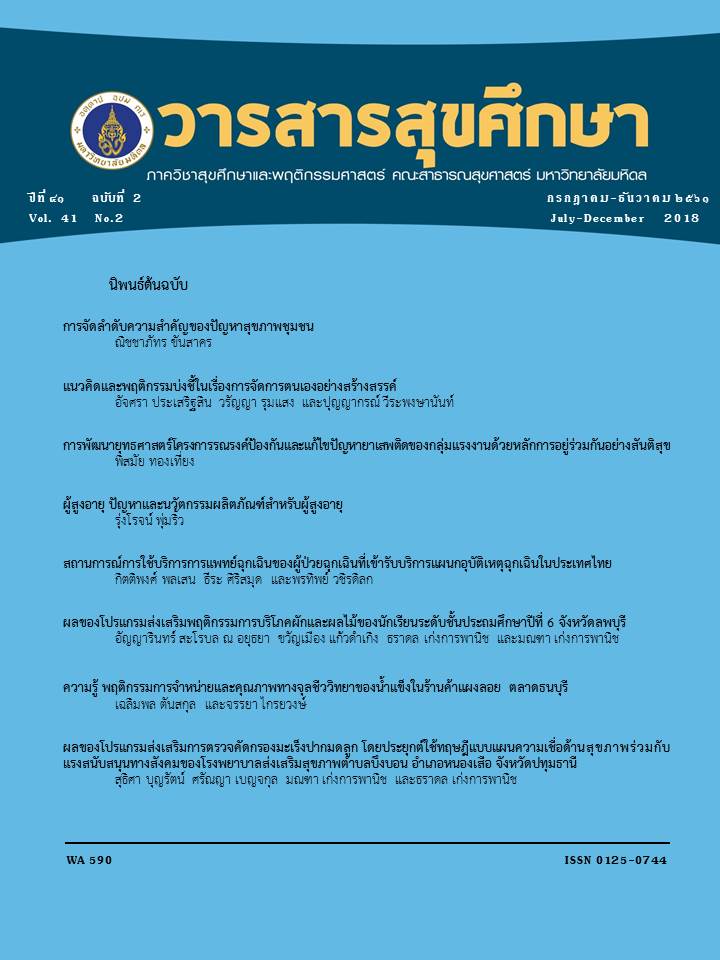ประสิทธิผลของโปรแกรมพฤติกรรมส่งเสริมสุขภาพการบริโภคอาหารต่อการรับรู้ ความรุนแรง การรับรู้โอกาสเสี่ยงของการเกิดโรค การรับรู้ในผลลัพธ์ต่อการตอบสนองที่ดี ในการควบคุมการบริโภคอาหาร การรับรู้ความคาดหวังในความสามารถตนเอง และแรงสนับสนุนทางสังคม ในนักเรียนชั้นประถมศึกษาปีที่ 4-6 ที่มีภาวะโภชนาการเกิน
คำสำคัญ:
โปรแกรมพฤติกรรมส่งเสริมสุขภาพการบริโภคอาหาร, ทฤษฎีแรงจูงใจเพื่อการป้องกันโรค, แรงสนับสนุนทางสังคม, ภาวะโภชนาการเกิน, นักเรียนชั้นประถมศึกษาปีที่ 4–6บทคัดย่อ
การศึกษานี้เป็นการวิจัยแบบกึ่งทดลอง เพื่อศึกษาประสิทธิผลของโปรแกรมพฤติกรรมส่งเสริมสุขภาพการบริโภคอาหารต่อการรับรู้ความรุนแรง การรับรู้โอกาสเสี่ยงของการเกิดโรค การรับรู้ในผลลัพธ์ต่อการตอบสนองที่ดีในการควบคุมการบริโภคอาหาร การรับรู้ความคาดหวังในความสามารถตนเอง และแรงสนับสนุนทางสังคม ในนักเรียนชั้นประถมศึกษาปีที่ 4 - 6 ที่มีภาวะโภชนาการเกิน โรงเรียนในสังกัดสำนักงานเขตพื้นที่การศึกษาประถมศึกษาสกลนคร เขต 1 กลุ่มตัวอย่างจำนวน 80 คน แบ่งเป็นกลุ่มทดลองและกลุ่มเปรียบเทียบกลุ่มละ 40 คน กลุ่มทดลองได้รับโปรแกรมพฤติกรรมส่งเสริมสุขภาพการบริโภคอาหาร ระยะเวลา 8 สัปดาห์ เก็บรวบรวมข้อมูลโดยใช้แบบสัมภาษณ์ วิเคราะห์ข้อมูลโดยใช้สถิติเชิงอนุมาน Independent t-test เปรียบเทียบความแตกต่างค่าเฉลี่ยของคะแนนของทั้งสองกลุ่ม ที่ระดับนัยสำคัญทางสถิติ 0.05
ผลการวิจัยพบว่า ภายหลังการทดลอง เมื่อเปรียบเทียบความแตกต่างค่าเฉลี่ยของคะแนนระหว่างกลุ่มทดลองและกลุ่มเปรียบเทียบก่อนและหลังการทดลองพบว่า กลุ่มทดลองมีพฤติกรรมด้านการรับรู้โอกาสเสี่ยงของการเกิดโรค การรับรู้ในผลลัพธ์ต่อการตอบสนองที่ดีในการควบคุมการบริโภคอาหาร การได้รับแรงสนับสนุนด้านข้อมูลข่าวสาร ด้านอารมณ์ ด้านทรัพยากร สูงกว่ากลุ่มเปรียบเทียบอย่างมีนัยสำคัญทางสถิติ(p<0.05) และมีค่าเฉลี่ยผลต่างของน้ำหนักตัวลดลงมากกว่ากลุ่มเปรียบเทียบ 2.08 กิโลกรัม อย่างมีนัยสำคัญทางสถิติ (p<0.05)



